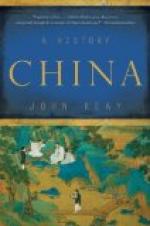1 Economic and social situation in the south
During the 260 years of alien rule in North China, the picture of South China also was full of change. When in 317 the Huns had destroyed the Chinese Chin dynasty in the north, a Chin prince who normally would not have become heir to the throne declared himself, under the name Yuean Ti, the first emperor of the “Eastern Chin dynasty” (317-419). The capital of this new southern empire adjoined the present Nanking. Countless members of the Chinese gentry had fled from the Huns at that time and had come into the southern empire. They had not done so out of loyalty to the Chinese dynasty or out of national feeling, but because they saw little prospect of attaining rank and influence at the courts of the alien rulers, and because it was to be feared that the aliens would turn the fields into pasturage, and also that they would make an end of the economic and monetary system which the gentry had evolved for their own benefit.
But the south was, of course, not uninhabited. There were already two groups living there—the old autochthonous population, consisting of Yao, Tai and Yueeh, and the earlier Chinese immigrants from the north, who had mainly arrived in the time of the Three Kingdoms, at the beginning of the third century A.D. The countless new immigrants now came into sharp conflict with the old-established earlier immigrants. Each group looked down on the other and abused it. The two immigrant groups in particular not only spoke different dialects but had developed differently in respect to manners and customs. A look for example at Formosa in the years after 1948 will certainly help in an understanding of this situation: analogous tensions developed between the new refugees, the old Chinese immigrants, and the native Formosan population. But let us return to the southern empires.
The two immigrant groups also differed economically and socially: the old immigrants were firmly established on the large properties they had acquired, and dominated their tenants, who were largely autochthones; or they had engaged in large-scale commerce. In any case, they possessed capital, and more capital than was usually possessed by the gentry of the north. Some of the new immigrants, on the other hand, were military people. They came with empty hands, and they had no land. They hoped that the government would give them positions in the military administration and so provide them with means; they tried to gain possession of the government and to exclude the old settlers as far as possible. The tension was increased by the effect of the influx of Chinese in bringing more land into cultivation, thus producing a boom period such as is produced by the opening up of colonial land. Everyone was in a hurry to grab as much land as possible. There was yet a further difference between the two groups of Chinese: the old settlers had long lost touch with the remainder




